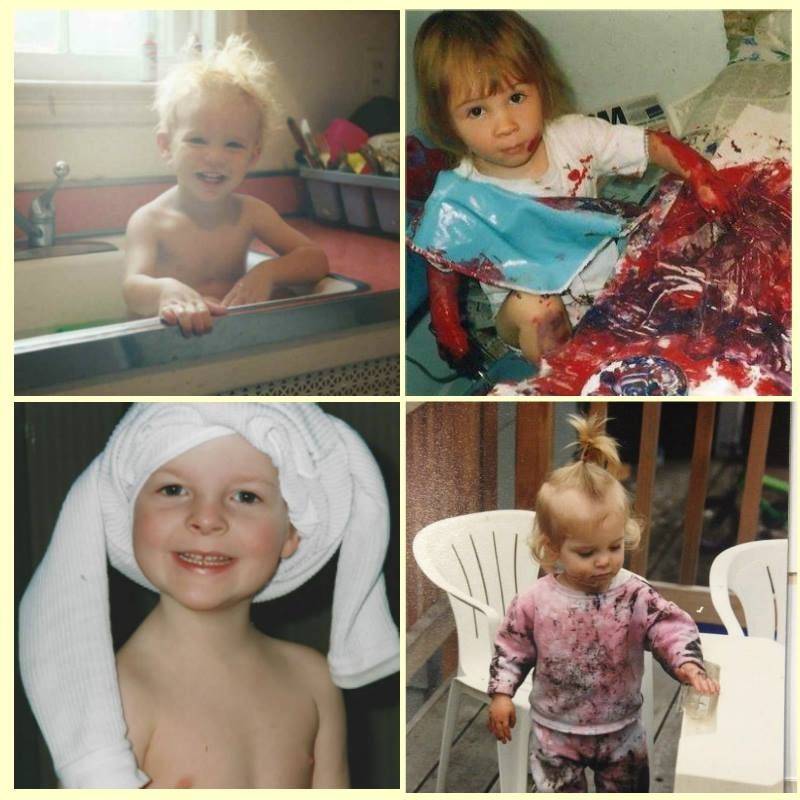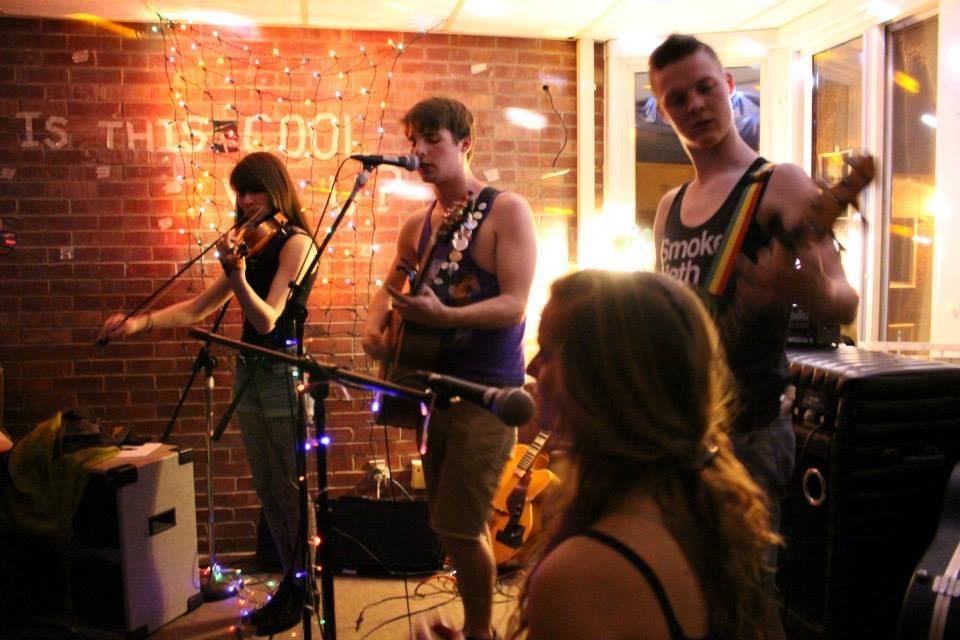I talked to Kirby Jayes (pictured second from the left above), of An Evening with Your Mother and Opus Dog, about his new album, its tour, and a book he is writing about the do-it-yourself process of making music.
Smile Politely: How about this tour and the book you’re writing? I’m fascinated.
Kirby Jayes: I’m on tour through August, beginning this Saturday with the show at Mike ‘N Molly’s. The first stint is with the full band of Opus Dog, albeit with a couple of substitutions in members, since Lucy and Cheyenne both have to work. The second leg is my Montana friend, Nathan Snow, and [me] on a solo tour that takes us south and east and then all the way west to San Diego, then north through the Pacific Northwest with the eventual destination of Montana. I’ll spend a couple of weeks there working on the book and then limp my way back home across the upper Midwest to get back to school this fall.
The book project is basically an outgrowth of that tour. I was very lucky to receive a grant from Beloit College to explore Do-It-Yourself music, musicians and communities across the country. In such an obviously transitory era in the music industry, I think it’s important to explore this and try and see what holds all these communities and musicians together. What does it mean for music that everyone who wants it has a worldwide distribution network at their fingertips? Is it more democratic for those that have the music and really put in the work, or are there powers that be that you still need to play nice with and/or compromise yourself for? DIY is something that has been around forever, but we’re entering into a time in music where making it as a musician seems to call for more and more of that spirit. The goal is to take a look at these conflicts in action, but also to make a readable, memoir-style, piece of writing out of it that’s interesting to read, even for people who aren’t involved in these movements. At the end of the day, I’ve found myself in a great place where I can drive across the country playing guitar every night and see America. It’s a fascinating, weird, country out there and we’re going to go see what we see and let the book be shaped by that.

Cover art for Opus Dog’s Responsible People
SP: Introduce yourself to our readers. How did you get involved in Opus Dog?
Jayes: I’m Kirby Jayes and I play the guitar. I do some other things as well, like go to school and work as a supervisor in the scene shop in my college’s theater department, but mostly I play guitar and sing songs. I’ve been playing in bands since I moved to Champaign, back in 2009. After graduating from high school, I broke camp for Beloit College in Wisconsin. I had been playing mostly in An Evening With Your Mother here in Champaign but had been experimenting slowly with putting together a solo set. After moving out of state and being able to work with AEWYM a lot less, I started pursuing that more seriously. It quickly made itself clear to me that playing with a band is a lot more fun than playing alone, not to mention that having other people contribute to the music makes it much more interesting. I grabbed three of my coworkers at a party that I knew played instruments, that I wanted involved (Linden Holt plays bass, Lucy Holden plays fiddle, Cheyenne Kern sings much better than I do) and told them I had a name for a band and a bunch of songs and needed people to play them with. I’m not sure I’d actually heard any of them play their instruments before that, but we had a band.
SP: Sometimes you just have to go for it, man. How would you describe your music writing process? Is it a collaboration or do a couple of people write and present lyrics… ?
Jayes: As things work now, I come to the band with what are essentially the bones of a song. It’s “done,” in a rough-draft sort of sense. Usually I’ll bring a song in this condition to practice and give everyone the chord changes and we’ll run through it a few times. The other members of the band will start writing parts around the bare thing that I’ve given them as we’re playing through the song. After a while we’ll usually stop and people will throw out different sorts of arrangement ideas and we’ll try different variations on those. When we’ve got something that we’re happy with, we’ll go back to running through the song… making minor tweaks and adjustments along the way and as ideas come to us.
In short: I’ve been writing all the songs, although there have been some others brought to practice that we haven’t had time to work out, and the band writes the music collaboratively in practice. I usually have a vague idea of where things might go, but these songs wouldn’t be what they are without the four of us getting together in a room and working on them.
SP: What inspires you as a song writer? Do you write from experience, emotion, other art forms, what?
Jayes: My songs usually contain some autobiographical element, but they’re not exactly about me. I use music to address things that I feel or connect with, without writing about a specific situation that I’m in. On one hand, songs are a great place to be an exaggerated character, whether that’s being the shittiest version of yourself and playing this cathartic iteration of you, or by singing something more direct and more honest than anything you would have the courage to put into words normally. On the other, if I only write about specific things that happen to me and that matter to me, then there’s nothing there for people to connect with, and what I’m really interested in is the way other people hear these songs and interact with them. So a song might mean one thing to me and have a personal meaning, but I don’t think that should be important to the listener. The point is that someone else have their own experience with it.
So I try not to draw too strongly on my personal life. I’m always listening to music, but I don’t sit down and go “I’m going to write a song that sounds like Wilco,” or “I’m going to write a song that sounds like Bruce Springsteen” or whoever, because those sounds are taken. I definitely have an ear for what I like and what I don’t like, and part of the goal is making music that I would want to listen to, so I’d say that other music definitely counts as a point of inspiration. I borrow from my friends a lot. Sometimes someone will say something funny or weird or just prescient and I’ll tell them right away that it’s going to end up in a song somewhere. I do the same with strangers and a lot with books. When I borrow from books it’s about intentionally using a known source as a touchstone that, if someone wanted to do a close reading of my lyrics and chase that down, would open up another portion of the songs meaning, while also remaining accessible for the vast majority of people to enjoy without looking too closely under the hood. At the end of the day it’s mostly about keeping my eyes and ears open… [to something] that will send me somewhere that leads to a song.
SP: Who are some of your influences as an artist (or just a person)?
Jaye: Of course my friends and family all influence me both as an artist and a person. In terms of people that I don’t actually know but find inspiring, I’d have to go with Dylan or Springsteen or Frank Turner or Patrick Stickles from Titus Andronicus. As far as writers go: I know that it’s cliche to love Kurt Vonnegut, but on the other hand he is just unbelievably good. I had/am having a very long Hunter Thompson phase, not because I want to emulate his life or actions or anything, but because I’m really interested in the death of the American dream narrative that he struggled with for a long time. It’s a really interesting question to me of how we get from, for example, the line in “Thunder Road” that goes “it’s a town full of losers, and I’m pulling out of here to win” to the line in Titus [Andronicus’] “No Future Part III” that says “you will always be a loser, and that’s okay.” There’s definitely a shift in the public consciousness, especially considering all the Springsteen comparisons that Titus [Andronicus] and some others get in the music media. I’m really drawn to writers like that who have this really perfect grasp on the language of American loserdom, like Craig Finn from the Hold Steady or TC Boyle, people who aren’t afraid to explore the ugly side of things a little bit while still writing really beautiful and honest songs and albums and books.
One of my favorite examples is Springsteen’s “Johnny 99″, which is this absolutely heartbreaking song where the main character just snaps under all the pressures of his life, he loses his job and has these “debts no honest man can pay.” He gets drunk and shoots a night clerk “down in the part of town where when you hit a red light you don’t stop.” The judge gives him 99 years in prison, and at the conclusion of the song Johnny gets a chance to speak, and he says to the judge “your honor I do believe I’d be better off dead, if you can take a man’s life for the thoughts that are in his head. So why don’t you sit back in that chair and think it over judge one more time, and have them shave off my hair and put me on that execution line?” And it ends there. There’s no resolution, just this horrifically sad plea to get it over with. I can’t put my finger on exactly what it is about that song that makes it work so well. It’s just him and a four track recorder in a room pouring this story out. It’s that mystery element that really inspires me.
I’m still not sure what makes a great song great but I know it when I hear it, and chasing that feeling is my biggest inspiration. I’m doing my very humble best to recreate feeling of hearing a line that just lands perfectly and does things that it really shouldn’t be able to do.
SP: I have never heard that Springsteen song! Heartbreaking. And awesome.
Witness the beginning of Kirby Jayes’ tour with Opus Dog and his Montana friend this Saturday at Mike ‘N Molly’s. You can’t beat live music in that beer garden in June. They’re playing with Finer Feelings, Dupond Dupont, and Bat Catman.








